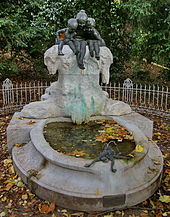Albert Poensgen (physician)
Albert Poensgen (born May 1, 1856 in Mauel near Gemünd (Schleiden) , † August 27, 1928 in Düsseldorf ) was a German doctor , forest property owner and co-founder of various colonial societies for German East Africa .
Live and act
Albert Poensgen came from the well-known Düsseldorf industrialist family Poensgen , which has its origins as the Reidemeister family in the Schleiden / Eifel area, and was the son of the Düsseldorf industrialist Albert Poensgen and Emma Rotscheidt (1828–1892). After attending grammar school in Düsseldorf, he then studied medicine at Heidelberg University . In 1877 he became a member of the Corps Guestphalia Heidelberg . After the state examination, he worked as an assistant doctor at the surgical university clinic in Heidelberg. Then he moved to Düsseldorf and established himself as a general practitioner there . Since he was no longer able to work because of a serious eye disease, he instead retrained as a businessman and subsequently took on a number of offices in business. So he became a member of the Supervisory Board of Deutsche Petroleum AG in Berlin-Schöneberg and mining board of the trade union of the coal mine " Zeche Graf Bismarck " in Gelsenkirchen .
Albert Poensgen showed a keen interest and commitment to the situation of the German East Africa colony early on. On January 29, 1881, he was co-founder of the " West German Association for Colonization and Export " in the Düsseldorf Tonhalle , which was merged with the other regional associations on January 1, 1888 to form the " German Colonial Society " (DKG). In December 1890 he was again one of the co-founders of a new regional department of the DKG in Düsseldorf and was elected chairman there in 1894. Furthermore, Poensgen was one of the co-founders of the "West German Trading and Plantation Company" based in Düsseldorf in 1895 and was appointed chairman of the supervisory board. This company was active in the area of the Usambara Mountains in the province of Tanga in Tanzania and mainly traded in coffee. Poensgen continued to belong to the colonial council of the DKG until its dissolution in 1908. In addition, in 1904 he was co-founder of the not so important "Sisal Agave Society".
When his eldest sister Clara (1846–1910) married a distant relative, the industrialist Carl Poensgen , the “ Düsseldorfer Röhren- und Eisenwalzwerke AG ”. Poensgen ”, to be transferred into the hands of other family members, he and his brother Paul (1861–1920) were financially compensated along with other family members. His brother Paul acquired the manor Schloss Garath near Düsseldorf-Benrath and from then on ran horse breeding there. Albert Poensgen, on the other hand, acquired the Elisenhof forest estate in Arenberg near Koblenz and parts of the Arenberg and Lahnberg forests in 1900 . The Düsseldorf garden architect Reinhold Hoemann , who seven years later also designed the Poensgen Park in Ratingen for the aforementioned Carl Poensgen , supported Albert in the reforestation of a new forest park as well as the further expansion of the area with numerous mostly foreign conifers.
American occupation troops confiscated the "Elisenhof" for a long time after the First World War and built an officers' mess on it . After their departure, Albert Poensgen had the facilities completely restored. After his death in 1928, the property was transferred to his son Werner Poensgen (1891–1972). The fate of the family property was repeated after the Second World War , when American and French troops and the family of Johann Ludwig Graf Schwerin von Krosigk, who had been expelled from the east, were billeted. In 1946 the entire property was finally divided between the children and grandchildren.
In addition, Albert Poensgen was an active friend of alpine mountaineering throughout his life and was one of the co-founders of the German-Austrian Alpine Association , Düsseldorf section, which among other things had the "Düsseldorfer Hütte" built in the Ortler Alps area above the Suldental . Furthermore, during his time in Düsseldorf he was chairman of the " Beautification Association for the City of Düsseldorf". In 1905, on his initiative, this association had the popularly known “fairytale fountain” by the French sculptor Max Blondat (1872–1925) built in the Düsseldorf court garden .
Albert Poensgen was married to Adele Frings (1865–1950). Together with her he had two children, Margarete (Greta) (1890–1987) and Werner. The latter, in turn, had the children Ruth (1919–1972), Hanna (* 1921) and the later Chief Forestry Officer Albert Poensgen (* 1927).
Work (selection)
- Albert Poensgen: Communication of a rare case of Xanthelasma multiplex. In: Archives for Pathological Anatomy and Physiology and for Clinical Medicine. 91, 1883, p. 350, doi : 10.1007 / BF01925687 .
Literature and Sources
- Edmund Strutz (Ed.): German Gender Book , Volume 123, pp. 295 ff., 1958, Verlag CA Starke, Glücksburg, Ostsee
- Marianne Bechhaus-Gerst, Reinhard Klein-Arendt (eds.): Africans in Germany and black Germans - past and present . LIT, Münster 2004, ISBN 3-8258-6824-9 ( limited preview in the Google Book Search [accessed on September 14, 2010]).
Web links
swell
- ↑ Kösener corps lists : No. 888 p. 445 digitized version (58 MB!) , Accessed on August 9, 2012
| personal data | |
|---|---|
| SURNAME | Poensgen, Albert |
| BRIEF DESCRIPTION | German physician and clinic director as well as co-founder of various colonial societies |
| DATE OF BIRTH | May 1, 1856 |
| PLACE OF BIRTH | Gemünd (Schleiden) |
| DATE OF DEATH | August 27, 1928 |
| Place of death | Koblenz-Arenberg |

